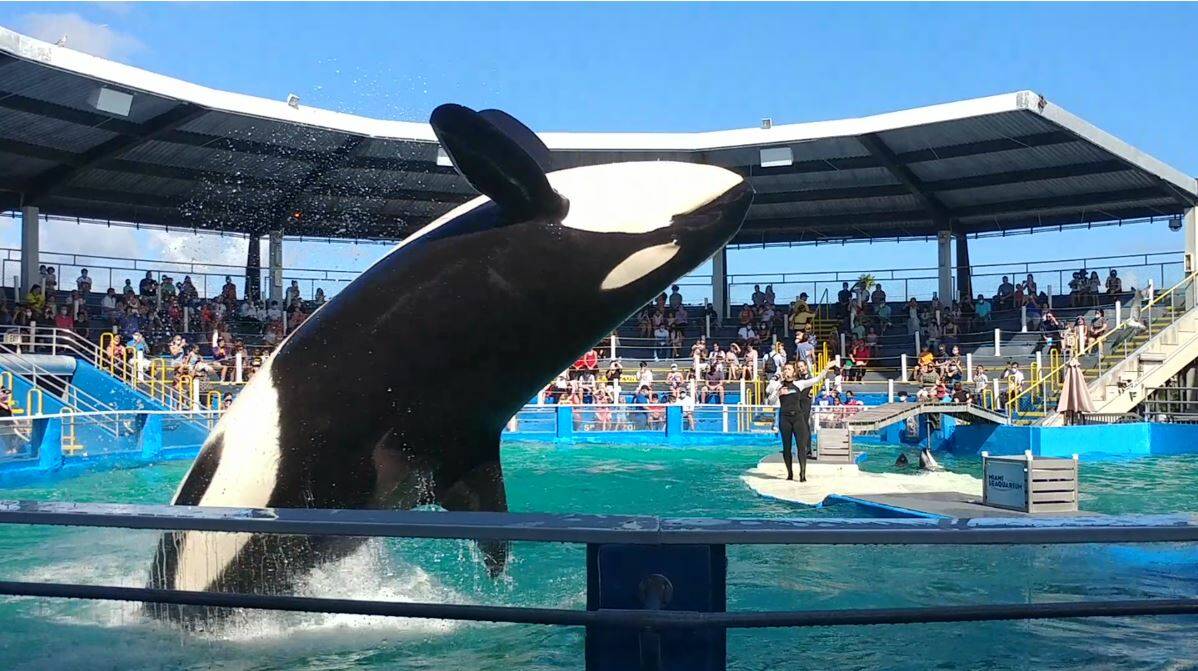The second oldest killer whale in captivity is officially off the clock, and she may finally return home to the Salish Sea.
The 56-year-old Southern Resident orca who has resided at the Miami Seaquarium since 1970 is known by many names: Lolita, Tokitae and most recently, Sk’aliCh’elh-tenaut. The latter name was given to her by Bill Tsi’li’xw James, the late hereditary chief of the Lummi Nation whose dream it was for her to come home.
MS Leisure, a subsidiary of The Dolphin Company, announced Friday that Lolita will stop performing and her tank will be closed to the public, per a U.S. Department of Agriculture license agreement the new aquarium owners signed.
Lolita has lived in captivity and been forced to perform for tourists at the Miami Seaquarium since her capture in the 1970 whale “roundup.” Men used boats, airplanes and explosives to drive a large family of the orcas to Penn Cove, where they were ensnared in nets. Nearly 40 of the whales were captured and 13 killed.
Lolita is the sole survivor.
Advocates for the whale are hopeful this might mean she will be returned to her home waters. A Florida real estate developer has already pledged $1 million towards her care. Lummi Nation elders are leading the efforts for her homecoming in partnership with the Whale Sanctuary Project, which includes compiling a comprehensive plan tailored to her needs and locating a place to build a spacious, netted structure in open waters.
In the Lummi language, the term for killer whales is qwe ‘lhol mechen, meaning “our relations below the waves.”
“She’s our relative, but we don’t have control of her,” said Squil-le-he-le Raynell Morris, a Lummi Tribal elder. “She’s a corporate asset. She has federal regulations. We’ve had to build the right team to answer all these questions and do it in the best way for her.”
A video clip available to view on sacredsea.org details the dimensions of the proposed netted enclosure.
Like many others, Morris was excited to hear about Sk’aliCh’elh-tenaut’s retirement.
“Now she can start healing, because that’s been really hard on her performing in that heat, no shade, having to perform for food,” she said. “The fact now that she gets to have some time to recover and to heal, and now that MS Leisure knows everyone is watching how and what they do for her.”
People have been working to secure Lolita’s release for decades without success. There have been countless newspaper and TV news stories about her ordeal. Such celebrities as Elton John and Johnny Depp even lent their names to an effort to free her in 2008.
Whidbey resident Howard Garrett, co-founder of the Orca Network, has staunchly advocated for Tokitae’s return since 1995.
He acknowledged that a recent surge in global support for the release of the whale – such as the Change.org petition that has garnered over 35,000 signatures – has helped the cause.
“They can’t keep her out of sight now. Everybody wants to know how she’s doing,” he said. “That is a huge player in all of this. The force of public opinion is what is going to bring her home.”
Ultimately, the decision about whether she will come home or not will be up to the Dolphin Company. Previous owners of the Miami Seaquarium have vehemently opposed her release.
Despite some health scares – and a scathing report released by the USDA last summer concerning subpar water conditions and food supply – the geriatric whale has remained in good health.
“It’s remarkable that she has kept her spirit alive and healthy all these years,” Garrett said. “That’s one of the most important parts of this story, that she’s still strong.”



